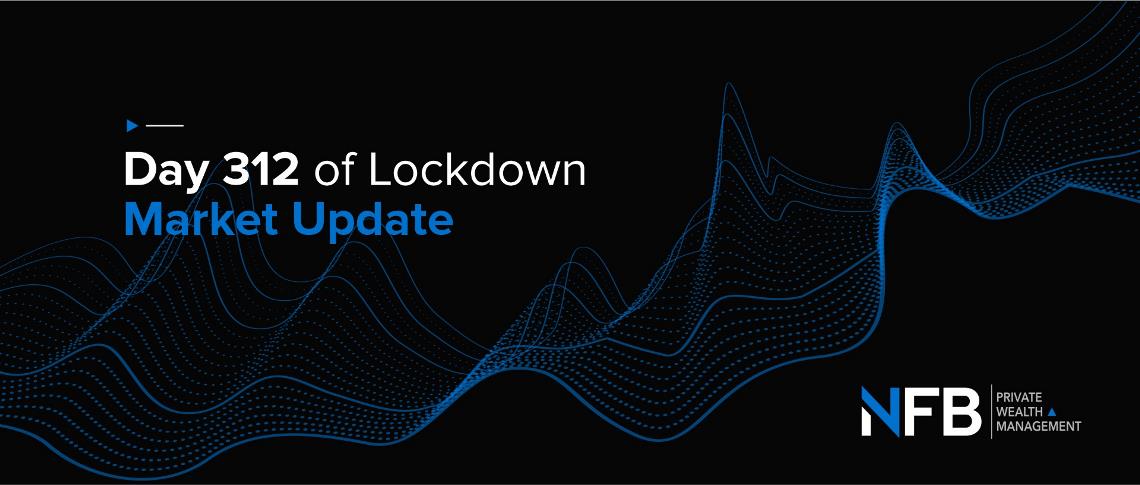Day 312 of Lockdown | Market Update
The latest in a weekly series of alert level 3 lockdown-inspired market commentaries


Alert level 3 appears to be achieving its intent. South Africa’s active case count is approaching 100,000, having peaked at almost a quarter of a million during this second wave. In the first week of January, new daily confirmed positive coronavirus cases were in excess of 20,000. That number is now below 5,000. Unfortunately, new daily deaths remain elevated and many more are likely to lose their lives to the disease as people previously diagnosed as Covid-19 positive unfortunately ultimately succumb to the disease. As the second wave ebbs away from us, an argument for an early relaxation of alcohol restrictions begins to emerge. This being critical for not only the alcoholic beverages industry, where job losses are already underway and where foreign direct investment is already being curtailed, but also for the services industry for which government has had to embark of a specific tourism initiative. The President is only expected to address the Nation on February the 15th but there is some talk that a relaxation of alcohol-related restrictions may be tabled within the framework of maintaining South Africa’s alert level 3 status before then.
Progress continues to be made globally on the vaccine front, the latest being Johnson & Johnson’s single shot vaccine that doesn’t require continuous cold storage. However, unlike double dose regimes from Pfizer and Moderna that do require refrigeration, efficacy rates for the J&J shot are estimated at between 65% and 85% whereas the others are well north of 90%. Also complicating matters is the EU’s stance communicated last week that vaccines manufactured in the EU are not to be exported, coining a new term: “vaccine nationalism”. The World Bank has, however, taken a trans-national role in supporting a $12bn program for the acquisition of vaccines for Africa. South Africans would be pleased to read over the weekend that 20m vaccine doses have been secured and that President Cyril Ramaphosa was personally overseeing delivery of the first consignment. Less pleasing though were rumours during the week that South Africa’s Covid-19 vaccination program was a tender opportunity in the making. Historical abuse of tender process raises significant concerns around the potential for inefficiencies and corruption at a time when getting the population vaccinated should be the primary focus.
US President Joe Biden has encountered some pushback to his $1.9 trillion coronavirus stimulus electoral undertaking, initially in paring back the size of the package to $1.2 trillion and subsequently only receiving Republican support for a $600 billion set of measures. This together with the lower efficacy rate of the J&J vaccine saw the largest weekly market retreat since October last year. Global equities in rand terms as measured by the MSCI World Index were down 3.5% last week. The JSE All Share Index was down 2.4%. The Fed though did keep interest rates unchanged and continued to commit to their $120billion bond buying programme. This follows similar decisions from the Bank of Japan, the European Central Bank and even the South African Reserve Bank the week before. Also last week, the IMF released their World Economic Outlook in which they increased their global growth expectation to 5.5% from 5.2% but lowered their expectation for South African growth from 3.0% to 2.8%. This talks to the view that developed markets are more likely to achieve higher rates of vaccination earlier than emerging and frontier markets.
Compounding matters last week, and wholly dominating all other newsworthy events from the week, was the GameStop/Reddit/Robinhood drama which almost absolutely demands a book from Michael Lewis (the author of Liar’s Poker, The Big Short and Flash Boys). While we wait for that one to be written, may we encourage you to check out the book We are the Nerds: The Birth and Tumultuous Life of Reddit, the Internet’s Culture Laboratory by Christine Lagorio-Chafkin, first published in October 2018 and featured in a previous edition of The Rationalist as a primer on what Reddit actually is. There’s lots to talk about here. One aspect is the freedom to express and organise oneself however one chooses (in many cases a constitutionally enshrined right), even if that is to wildly bid up the price of stocks. The other is the ability to limit this freedom through regulation, the Securities and Exchange Commission in the US has a role to play here in ensuring things don’t get completely out of hand, and through contract, as Robinhood did by enforcing the terms of agreement limiting trading activity that isn’t properly catered for even if this goes against their democratic, liberal trading philosophy. Remember, people trading on this platform would have consented to these terms when they first signed up. And, lastly, for this publication at least, is the idea of properly functioning capital markets. Specifically, the aspects of capital raising and price discovery. Certain companies, as well as people in their personal capacities, associated with this activity have been able to sell shares at vastly inflated prices. At some point price will reflect value by which time wealth will already have moved from one set of hands to another. We can hazard a reasonably strong guess in which direction this will flow. And we haven’t even begun to contemplate the actions of short-sellers and whether their behaviour is a natural aspect of price discovery or if they’ve just had their comeuppance.
Reiterating Stephen Dubner from Freakonomics whom we alluded to last week: take care of yourself and, if you can, take care of someone else. Weekly Chart Book here for those who wish to look a bit deeper.
Market Data
| Asset Class | Last Week | Last Month | Last Year | Last 3 Years |
| Local Cash | 0,07% | 0,31% |
5,12% | 6,53% |
| Local Bonds | 0,27% | 1.30% | 8,80% | 8,62% |
| Local Property | 0,67% | -3,16% | -34,14% | -18,93% |
| Local Equities | -2,37% | 5,49% | 13,92% | 4,09% |
| Global Property | -0,73% |
0,23% | -10,41% | 2,55% |
| Global Equity | -3,54% | 0,09% | 15,80% |
8,12% |
| USDZAR | -0,14% | 2,51% | 3,06% | 7,90% |
Helpful Resources
Please take the following into account:
- Wherever possible, total return indices have been used. These include the effects of dividends, interest and coupon payments in addition to price movements. Please take data presented as, generally, inclusive of price and income effects.
- Performance and other market data excludes the effect of income, capital gains and dividend withholding taxes as well as excluding advice, administration and asset management costs. Please take data presented as exclusive of tax and cost effects.
- Data is based on the previous Friday’s closing prices but as the situation is fluid the market commentary may or may not extend beyond Friday’s close. Other data, links, estimates, etc referred to are correct as at the time of writing.
- Collective investment schemes and other similar products performance information is based on data provided by Morningstar, which is signed off the first week of each month. In general, we will refrain from covering this until sign-off is obtained.
- NFB Asset Management publishes a monthly newsletter called The Rationalist. For as long as these weekly emails are being sent we have elected not to publish The Rationalist. Expect the monthly NFB AM schedule to resume once the lockdown is lifted.
- The previously used Refinitiv data code for Local Bonds (SAFRALL) has been discontinued, therefore a new code (ASAGVAL) has been used for calculations moving forward which is subject to revision in the future.













